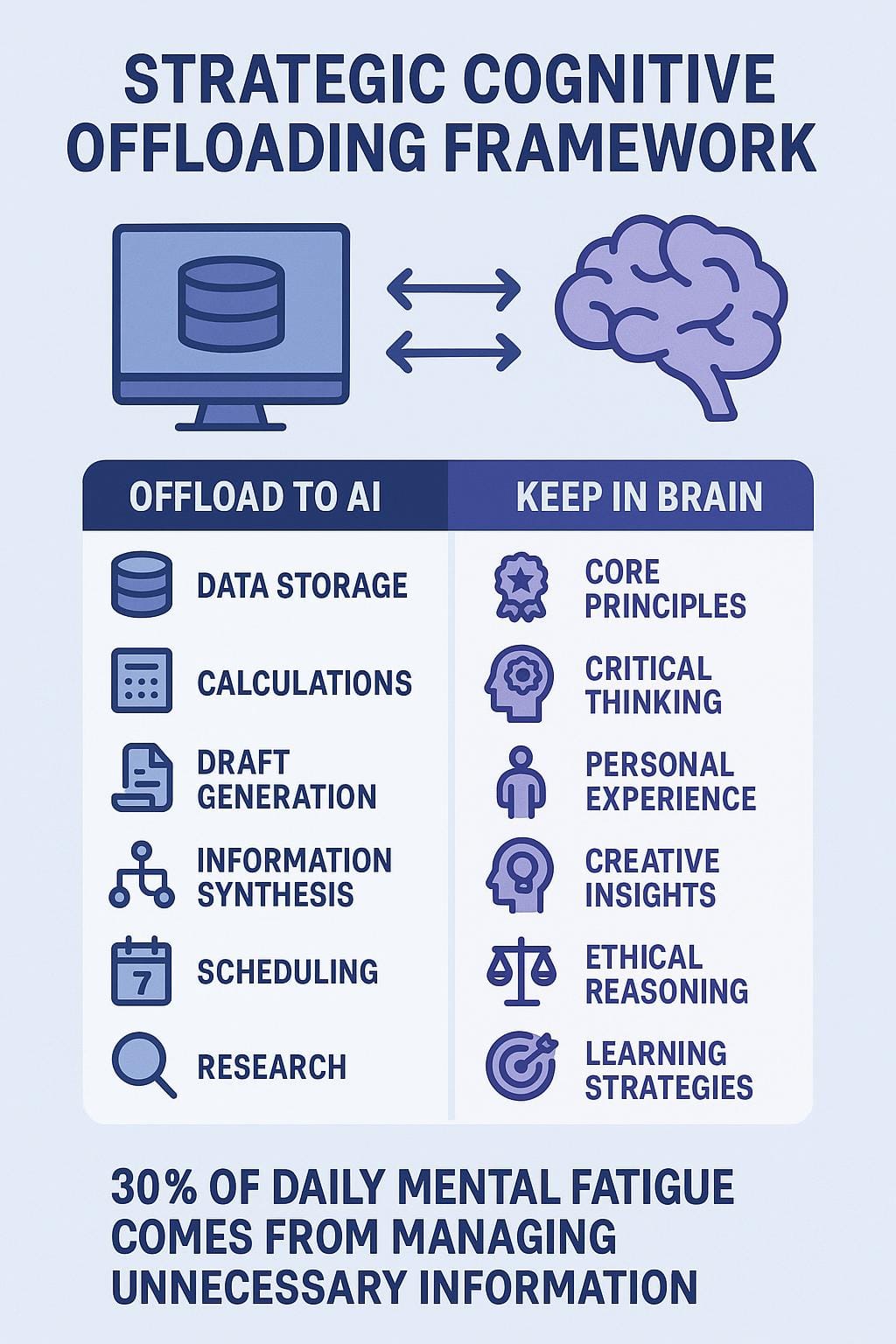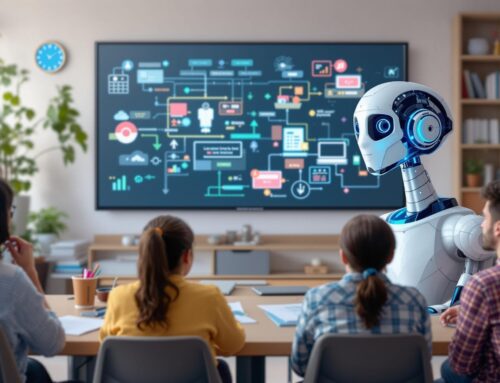Cognitive offloading represents a fundamental shift in how we manage information by strategically delegating mental tasks to external systems like AI. This practice isn’t just a modern convenience but a scientifically-backed approach that can enhance your learning capacity by freeing up valuable mental resources for deeper thinking and creativity.
Key Takeaways
- Cognitive offloading is the strategic process of transferring mental tasks to external tools to reduce cognitive load
- Human working memory is limited to approximately 7±2 items at once, making offloading necessary for complex learning
- Not all knowledge should be offloaded—core concepts and critical thinking skills must remain internalized
- Effective AI integration requires a balanced approach between technological assistance and developing your internal abilities
- Regular practice of metacognition strategies helps maintain this balance and prevents overreliance on external tools
This post contains affiliate links. As an Amazon Associate, I earn from qualifying purchases at no extra cost to you. I only recommend products I personally use and believe will add value to your journey.
Understanding Cognitive Offloading: Your Mental External Hard Drive
Cognitive offloading is the process of relieving mental burden by transferring information or tasks to external sources. Think of it as creating a mental external hard drive that stores information so your brain doesn’t have to actively maintain it.
This practice isn’t new to human behavior—we’ve been offloading cognition since the invention of writing systems thousands of years ago. From paper calendars to calculators, humans have always sought ways to extend their mental capabilities through tools.
📦 Essential Tools for Cognitive Offloading
- 🔗 ReMarkable 2 Paper Tablet – digital note-taking with paper feel
- 🔗 Rocketbook Smart Notebook – reusable pages with cloud backup
- 🔗 Sony Digital Voice Recorder – capture ideas instantly
As an Amazon Associate, I earn from qualifying purchases.
Research indicates that up to 30% of our daily mental fatigue stems from managing information we don’t need to store internally. By offloading these mental tasks, we can significantly reduce cognitive strain and improve our performance on more demanding cognitive tasks.
The concept of external cognition is supported by the extended mind thesis, which proposes that our cognitive processes aren’t confined to our brains but extend into our environment. This perspective helps explain why using AI as a second brain feels so naturally complementary to our thinking process.
The Science of Memory and Cognitive Processing in the Digital Age
Human working memory has strict limitations—we can hold only about 7±2 items in mind simultaneously. This cognitive constraint, identified by psychologist George Miller, explains why we struggle to process large amounts of information without external support systems.
Context switching between tasks comes at a significant cost. Studies reveal that we lose up to 40% of our productivity when multitasking, as our brains require time to readjust to each new task context.
Our attention span is equally limited. The average person can sustain focused attention for only about 20 minutes before requiring a reset, making continuous deep learning particularly challenging without strategic breaks or supports.
Related Guides: Check out our related articles for more helpful tips and insights.
The good news is that effective cognitive offloading correlates with improved problem-solving abilities. Research shows a 15-20% improvement in complex reasoning tasks when people strategically offload appropriate information to external systems.
These findings highlight why AI tools can be so valuable for learning—they directly address our biological cognitive limitations. When used properly, they don’t replace thinking but rather enhance our capacity for higher-order thought by handling information storage and retrieval.
📦 Brain Optimization Tools
- 🔗 Sony WH-1000XM4 Headphones – eliminate distractions for better focus
- 🔗 Pomodoro Timer Cube – optimize work intervals for maximum productivity
- 🔗 Natural Focus Supplements – support cognitive function naturally
As an Amazon Associate, I earn from qualifying purchases.
The Strategic Cognitive Offloading Framework for AI Integration
Not everything should be offloaded to AI systems. Creating an effective cognitive partnership requires strategic decisions about what to delegate and what to internalize.
Here’s what you should consider offloading to AI:
- Raw data storage and retrieval (facts, figures, references)
- Routine calculations and data processing tasks
- Initial draft generation and idea expansion
- Information synthesis across multiple sources
- Scheduling systems and reminder functions
- Basic research gathering and summarization
However, these elements should remain primarily in your brain:
- Core principles and fundamental concepts of your field
- Critical thinking frameworks and evaluation skills
- Personal experiences and contextual understanding
- Creative connections and novel insights
- Ethical reasoning and value judgments
- Meta-learning strategies (understanding how you learn best)
For effective note-taking and knowledge management, I’ve found Notion’s AI-powered workspace offers the perfect balance of organization and accessibility. Its AI features help connect ideas while keeping me in control of the thinking process.
For ideation and content expansion, AI writing assistants can generate multiple perspectives on a topic while you focus on evaluating and refining them. This creates a powerful feedback loop between human creativity and machine processing power.
Mastering the Balance: From Dependency to Augmented Intelligence
Implementing effective cognitive offloading requires a systematic approach. Start by auditing your cognitive load—identify what mental tasks consume your energy and classify them according to their retrieval frequency and value.
Next, design personalized AI workflows for different learning contexts. For example, use AI for note expansion during lectures but practice manual summarization for crucial concepts you need to internalize.
📦 AI Learning Assistants
- 🔗 ChatGPT Plus Subscription – personalized learning assistance
- 🔗 Dragon Naturally Speaking – transcribe thoughts to text instantly
- 🔗 Kindle Scribe – combine reading and note-taking seamlessly
As an Amazon Associate, I earn from qualifying purchases.
The key to avoiding overreliance is implementing regular knowledge internalization practices. Schedule dedicated sessions to review AI-generated content and manually summarize the most important points in your own words, which forces deeper processing.
Combat potential digital amnesia by implementing a practice I call “progressive detachment”—gradually reduce your reliance on AI for familiar topics. After using AI to help learn a concept, try explaining it without assistance, which builds cognitive independence while benefiting from initial support.
Related Guides: Check out our related articles for more helpful tips and insights.
Implementing Effective Learning Techniques with AI Support
For maximum learning effectiveness, combine cognitive offloading with established learning science. Use spaced repetition systems to review key concepts at optimal intervals, reinforcing what you’ve chosen to internalize.
Practice active recall regularly by testing yourself on material rather than just reviewing it. This strengthens neural pathways for information retrieval, making your internal knowledge more accessible even as you delegate other information to AI systems.
📚 Recommended Reading
- 📖 How to Take Smart Notes by Sönke Ahrens – Perfect for building effective note systems
- 📖 The Extended Mind by Annie Murphy Paul – Explores how thinking extends beyond our brains
- 📖 Building a Second Brain by Tiago Forte – Comprehensive knowledge management system
As an Amazon Associate, I earn from qualifying purchases.
Use the Feynman Technique to identify gaps in understanding—try explaining complex concepts in simple terms. If you can’t explain it clearly, you’ve identified an area where you need deeper personal knowledge rather than AI assistance.
Track your progress with metacognition strategies—regularly reflect on what you’ve truly mastered versus what you’re dependent on external systems for. This self-awareness helps maintain a healthy balance between AI assistance and personal knowledge growth.
🛠️ My Complete Cognitive Enhancement Toolkit
Here’s everything I personally use and recommend:
Essential
As an Amazon Associate, I earn from qualifying purchases.
Remember that cognitive offloading isn’t about becoming less knowledgeable—it’s about strategic focus that allows deeper understanding of what truly matters. By letting AI handle routine information processing, you free up mental resources for the creative, critical, and conceptual thinking that represents the highest forms of human cognition.
Sources
Trends in Cognitive Sciences – Cognitive offloading
Proceedings of the National Academy of Sciences – Cognitive control in media multitaskers










